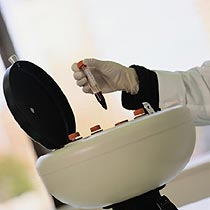Note: Testing for each type of Porphyria is found under the descriptions of each type of Porphyria.

The Porphyrias are readily diagnosed by laboratory testing, especially at or near the time of symptoms. However, the number of tests available is very large, and the results among laboratories are not always reliable. It may be difficult to choose the most appropriate test and properly interpret the results. Many of these tests are overused, resulting in unnecessary expense, delay in diagnosis, and even misdiagnosis of Porphyria. For these reasons, it is important to locate a laboratory skilled in performing tests for Porphyria and a physician skilled in interpreting the test results. The American Porphyria Foundation can help you locate laboratories and physicians with expertise in Porphyria.
Many of the symptoms of Porphyria are very similar to those experienced with other more common diseases. In other words, the symptoms of Porphyria are nonspecific. This is why the diagnosis of Porphyria is often delayed or even missed altogether. To avoid this problem, Porphyria should be considered and ruled out in the many patients who have compatible symptoms but may turn out not to have Porphyria. Laboratory testing is much more effective for confirming or excluding a diagnosis of Porphyria than is the case for many other types of illnesses. Therefore, laboratory tests are extremely important when a diagnosis of Porphyria is suspected.
The most common tests used for Porphyrias are measurements of substances that accumulate in large amounts in the body, especially when someone has active Porphyria. These substances, porphyrin precursors and porphyrins, can be measured in red blood cells (erythrocytes), blood plasma, urine and feces. Measuring enzymes in cells and looking for changes (mutations) in DNA is useful for confirmation and for family studies.
At present Labcorp, ARUP, & Quest are not recommended for EPP testing.
The University of Texas Medical Branch (UTMB) Porphyria Center is the only facility in the United States at an academic institution that is certified to accept samples for diagnostic biochemical testing of the Porphyrias. Upon completion of testing, they issue reports that include detailed interpretations of results. https://pmch.utmb.edu/clinics-services/porphyria-center